José Rocha went to the church because he had questions that needed answering. It was February 2000 in Bogotá, Colombia, and was, Rocha said, “one of those moments in life when you have to make decisions.”
When he walked through the door of the Iglesia de Dios Ministerial de Jesucristo — “La Ministerial” — there was someone tasked with spotting newcomers, greeting them enthusiastically, and seating them near the front. Toward the end of the service, the pastor turned to the novices and invited them to stay and receive la profecía. They would each hear a message from a member of the church who had the gift of prophecy, the pastor explained. Although it would be a human being uttering the words, God would be the one speaking, and his words would reveal to them things they needed to know — things about the future.
Rocha, despite already being an emergency room doctor at a prestigious hospital at the age of 29, felt lost.
His son was born the year before, thousands of miles away in New York City, where he lived with his mother, Rocha’s ex-girlfriend. “We separated when she was pregnant,” Rocha said. “And that was always my doubt. Did I do the right thing? What will the boy’s life be like growing up so far from his father? Am I selfish? Am I crazy?” The mother of Rocha’s child was also a member of the Ministerial, one of the reasons he went there seeking clarity.
When his turn came to receive prophecy, Rocha was approached by a man not much older than he. The man put both hands firmly on top of Rocha's head, then leaned forward and began murmuring into his ear. I have brought you here so that I can bless you, he started — general statements, intoned dramatically, in vaguely biblical rhetoric. I know you have been seeking me.
Then came the words that determined the next dozen years of José Rocha’s life. I will lead you to that foreign land, that place where your beloved lives, the one you love and value most. It was as if he knew exactly what to say.
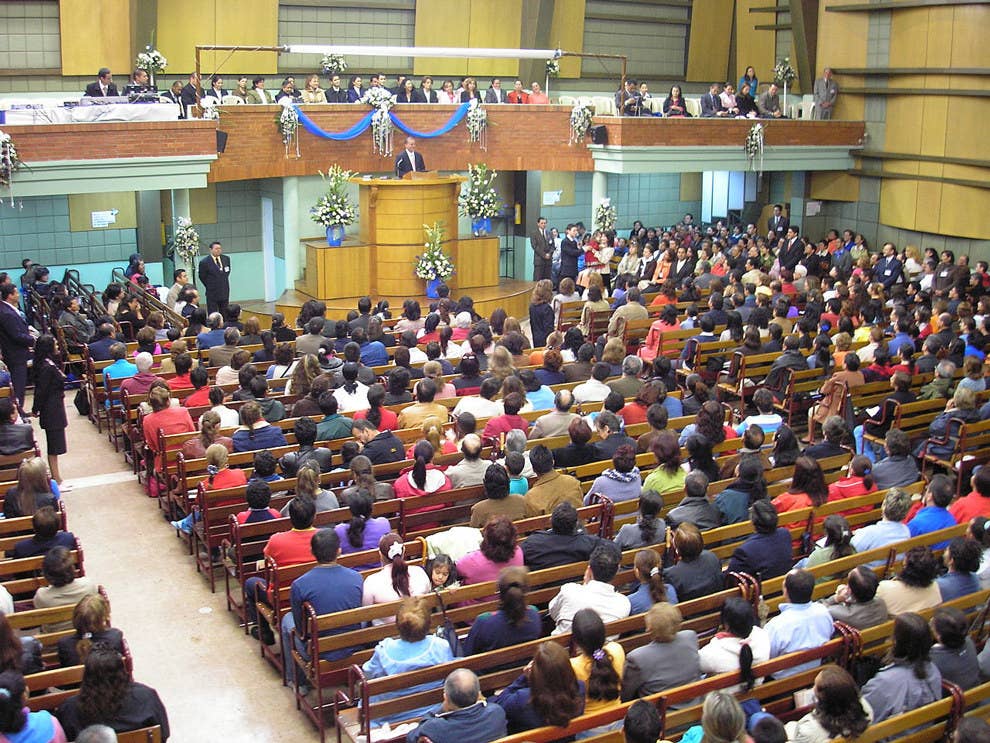
Rocha packed up his life and moved to New York City. He and his family, like many believers, built their lives entirely around the Ministerial, receiving prophecy on a regular basis and volunteering large amounts of time, money, and labor to the church and its political wing.
Twelve years later, Rocha wrenched himself away from what he had come to see as a damaging cult, one that exists to funnel wealth and political power into the hands of its leader.
That leader, a Colombian woman named María Luisa Piraquive, is revered by her followers as a prophet, the semidivine messenger of God on earth. Over the last two decades, she has used that influence to turn the Ministerial into a global empire with 868 locations in 48 countries. The church says it has more than 2.5 million followers worldwide, and while outside observers consider this figure exaggerated, defectors and experts still estimate its size to be somewhere in the mid to high hundred thousands. The bulk of its operations are in Colombia, where it also wields political power through an influential party with officials in every level of government.
Much of that political capital is accumulated abroad, where the Ministerial, according to its defectors, exploits the captive devotion of its immigrant members to advance its political project. In the United States, the Ministerial claims 89 locations from coast to coast, ranging from tiny storefronts to large temples in major cities. This is second only to the number of Ministerial churches in Colombia itself.
The rise of the Ministerial forms part of the relentless growth of Evangelical Christianity in Latin America and among its emigrants, a huge demographic shift that has shaken Catholicism’s once uncontested reign. But the church of María Luisa Piraquive stands apart for its zealous reverence for its leader, and for the strange rite at the heart of its doctrine — the practice of prophecy, a literal foretelling of the future that strays from Protestant orthodoxy. This ritual, according to the church’s defectors, is also the principal mechanism by which the Ministerial lures believers, isolates them, and manipulates them into submission to the church and its motives.
In a letter to BuzzFeed News, the Ministerial objected to defectors’ claims that it is a cult and said that many of the scandals that have afflicted the church over the years have been the result of defamatory fabrications motivated by religious persecution. “Out of 89 churches in the US alone, with thousands of congregants, it is telling that there are only a few vengeful detractors willing to make these false allegations against the church.” In other contexts, church leaders have pointed to the charitable work performed by the Ministerial’s affiliated nonprofits around the world.
To Rocha and a larger community of apostates, even the most seemingly well-meaning of the church’s endeavors are a ruse. “It’s not a church,” Rocha said. “It’s a business built on manipulation and fear.”
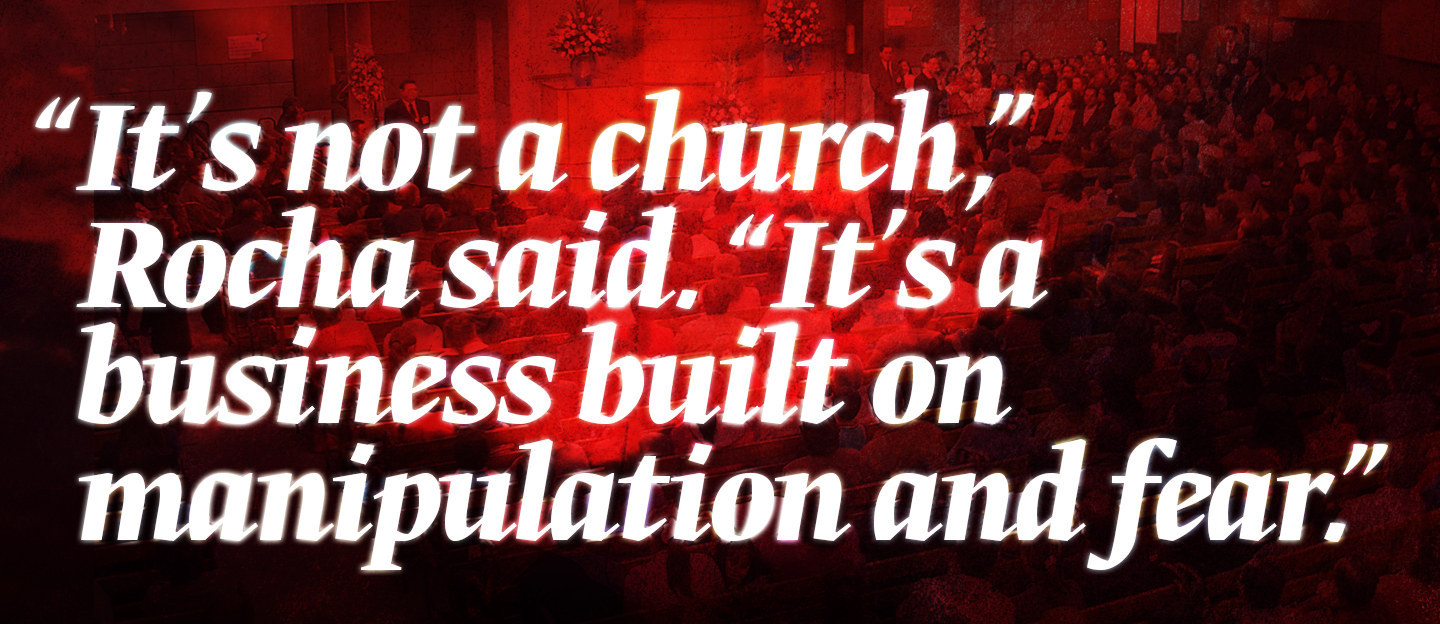
The Ministerial was small when Priscila Angulo found it in the early 1990s. Like many believers, she turned to the church in a moment of crisis. Her mother had suffered a brain aneurysm that left her in a vegetative state. Angulo felt trapped in a loveless and abusive marriage, having wed at 17 and quickly realized her husband was not the man she thought him to be. She needed a miracle.
At first, Angulo received vague prophecies about a person she loved who was ill. Later, the prophecies became more specific — one church member, who had accompanied Angulo to visit her mother in the hospital and had seen her improve, prophesied that she would be healed. Three months later, her mother recovered, and Angulo’s conversion was completed. At the time, the Ministerial was led by its founder, Luis Eduardo Moreno, María Luisa Piraquive’s husband. Moreno, a paternal figure beloved by his flock, saw a young devotee in the 21-year-old Angulo. Before she and her mother returned to their home in the state of Santander, half a day's drive from Bogotá, Moreno entrusted Angulo with a task: Find 10 people who are interested in starting a congregation, then call me.
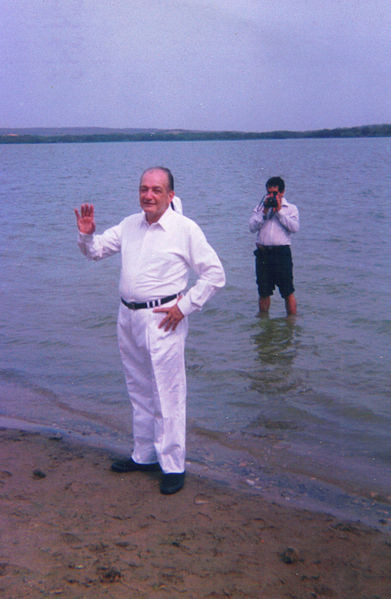
She did as she was told. On February 29, 1992 — it was a leap year — 10 people gathered in Angulo’s living room. Moreno showed up with María Luisa in tow and gave a brief sermon on the subject of 1 Corinthians 12, the Bible chapter that introduces the gifts of the Holy Spirit. When he finished, María Luisa, who hadn’t otherwise spoken much, circled the room and gave everyone prophecy.
“All of my friends were excited, because they thought they had just been told their futures,” Angulo said. After it was all over, Moreno told them they would meet again the next month and asked them to bring one person with them — not two, not none, but one.
At the next meeting there were exactly 20 people in Angulo’s house. “Then there were 40, then 80, then 160,” Angulo said. They started meeting in schools and restaurants, and when they passed 500 Angulo rented a permanent space in a disused factory.
“It was the perfect way to start a business,” Angulo said. “It was a pyramid. That’s how I look at it now.”
The Ministerial, in its letter to BuzzFeed News, called Angulo’s statement “false” and said that “the Holy Spirit revealed from the very beginning that He would bring the people to the church, and that the founders of the church did not have to do anything to bring people because all the work would be done by Him.”
As the church itself has grown dramatically over the years, the Piraquive family has accrued significant wealth, including several million-dollar homes in South Florida. The Ministerial’s members are expected to donate a tithe (10% of all their income) to the church, and are encouraged to make extra “offerings” — gifts of cash or clothes or anything else of value. The church has its own publishing house, part of a larger network of corporate holdings affiliated with the Piraquives and the Ministerial, and some larger temples sell magazines, CDs, Bibles, and other goods to worshippers. Defectors say members also routinely devote large amounts of uncompensated labor to the church — people from doctors to real estate brokers to chefs say they have done free work for the Ministerial and its leading family.
Still, according to defectors, many church members are poor, and others are not always obedient about paying their tithes, raising questions about whether the Ministerial's aboveboard fundraising is enough to explain the Piraquive family’s wealth. Last year news broke that a Ministerial pastor in Argentina was arrested in a drug ring and that Colombian prosecutors were investigating María Luisa Piraquive for drug trafficking and money laundering.

Over the course of their visits to Santander in the '90s, Angulo noticed that the union between Moreno and Piraquive was strained. He would silence her whenever she tried to speak, and she would glare at him with a “.38-caliber face.” No one spoke to Piraquive much, but Angulo forged a close relationship with Brother Luis, as he was known. She would call him regularly on the phone, asking for advice on all manner of things. “He became like a father to me,” Angulo said.
In May 1996, Moreno died suddenly. The publicly given cause was heart disease, although Angulo said she had always known Moreno to be a healthy and active man.
Moreno’s funeral in Bogotá was packed with his followers, including most every high-ranking member of the Ministerial. Piraquive called for a three-day vigil for her husband and predicted that it would culminate in his resurrection. On the third day, he was still dead. Piraquive told the church’s inner circle that the Lord had informed her that he would be keeping Brother Luis after all. (The Ministerial denies that Piraquive predicted Moreno’s resurrection.)
It came time, then, to choose the minister’s successors — the church was growing fast, and the flock was eager to know who would guide it into the future. Piraquive stood before the congregation and told them of her revelations, which dictated that leadership would be split between two of Moreno’s top lieutenants.
Piraquive cut a humble figure in those days. Video footage of the funeral shows a middle-aged woman with her jet-black hair in a shapeless cut, a far cry from the glamorous woman she would become. (Many years later, the church sued an anonymous person in the United States under copyright claims for posting the funeral video to YouTube.)
Brother Luis believed strictly that women were not to rise to the pulpit and preach, and that, Piraquive assured the flock, would not change. (The Ministerial has since changed this policy.) However, she informed the believers that she had always been the source of her husband’s divine inspiration. “The Lord used me to deliver the doctrine to Brother Luis,” she said. Earlier in her speech, Piraquive had reminded the believers that in the Old Testament one finds kings and priests, and then one finds prophets — male prophets and female prophets. “And God gave the same gifts and the same principles, the same power, to the female prophet as to the male prophet.”
Now Piraquive explained the meaning of that lesson. “The gift the Lord gave to me,” she said, “is the gift of the prophet.”

I will lead you to that foreign land…
The words had drilled directly into José Rocha’s core. “Caramba,” he thought. “How could it be that this person knows that this is what I’m going through?” On that first day in the Ministerial in Bogotá, Rocha was vulnerable. “There are moments in life when you don’t feel emotionally strong,” he said. “And the tendency is to look elsewhere for something that will solve the problem. You’re sensitive, and you get caught off guard. And you wind up believing that maybe it was God who spoke to you.”
“Now I understand that it’s simply a question of probability,” Rocha said. “Out of 100 people who sit down for prophecy, you might get it right with 30, and out of those, 10 will stay in the church. But those are people they’ll have tied down for a long time.”
That was February. By May, Rocha had quit his job, sold his car, packed his things, and boarded a plane to New York. His friends thought he was insane to abandon a stable career at the urging of a fortune-teller in an Evangelical sect. But to Rocha the move felt inexorable. The mother of his child was pregnant and alone the first time she went to the Ministerial, and was told in prophecy that the man she loved would return to her. This was fate — they were two sides of the same prophecy fulfilling itself.
Once in New York, Rocha and his girlfriend married and had a second child. The Ministerial’s presence in New York was small at the time, with some 40 believers gathering in a rented second-floor room in Jackson Heights, a heavily Colombian neighborhood in Queens. Rocha and his family went multiple times a week, spending the entire day on Sundays, riding the train an hour and a half each way from the Bronx. On weeknights they wouldn’t get home until after 10.
Their fellow parishioners lived similarly devoted lives, a level of commitment arising in part, Rocha said, from the immigrant’s sense of having been uprooted. “You feel a disconnection from your native land,” Rocha said. “So you arrive in this country, and you find in this group a way of feeling part of something related to what makes you who you are.”
They were hardly alone in their devotion. The Ministerial identifies itself as a neo-Pentecostal denomination, an outgrowth of Pentecostalism. Over the last few decades, Pentecostalism and other charismatic faiths have exploded in size across Latin America, Africa, and their respective diasporas. Pentecostalism, a Protestant denomination that emphasizes the personal, spontaneous, mystical elements of worship, is said to have originated in 1906 when a black preacher, William J. Seymour, the son of slaves and blind in one eye, held a series of sweat-drenched revival meetings on Azusa Street in downtown Los Angeles. Quickly expanding crowds of converts — black, white, and Mexican alike — got together to cast out spirits, yell and shout in tongues, and otherwise feel the presence of the Holy Spirit.
The Spirit-filled denominations draw their theological authority from passages in Corinthians that explain the various gifts the Holy Spirit is liable to give the true believer, among them divine healing and speaking in tongues. Prophecy is in there too, but in the conventional reading, the word means simply a revelation from God, more often intended to strengthen the faith and uplift the spirit in the present moment. The future has little to do with it.
Not so in the Ministerial, where the fortune-telling version of prophecy overshadows every other doctrine. Defectors say the church’s predictions are almost exclusively positive. “Generally they don’t tell you that your mother’s going to die,” Rocha said. “They say: ‘You will get a car, you will travel, you will fall in love, you will get a job offer’ … Health, wealth, and love, basically.”
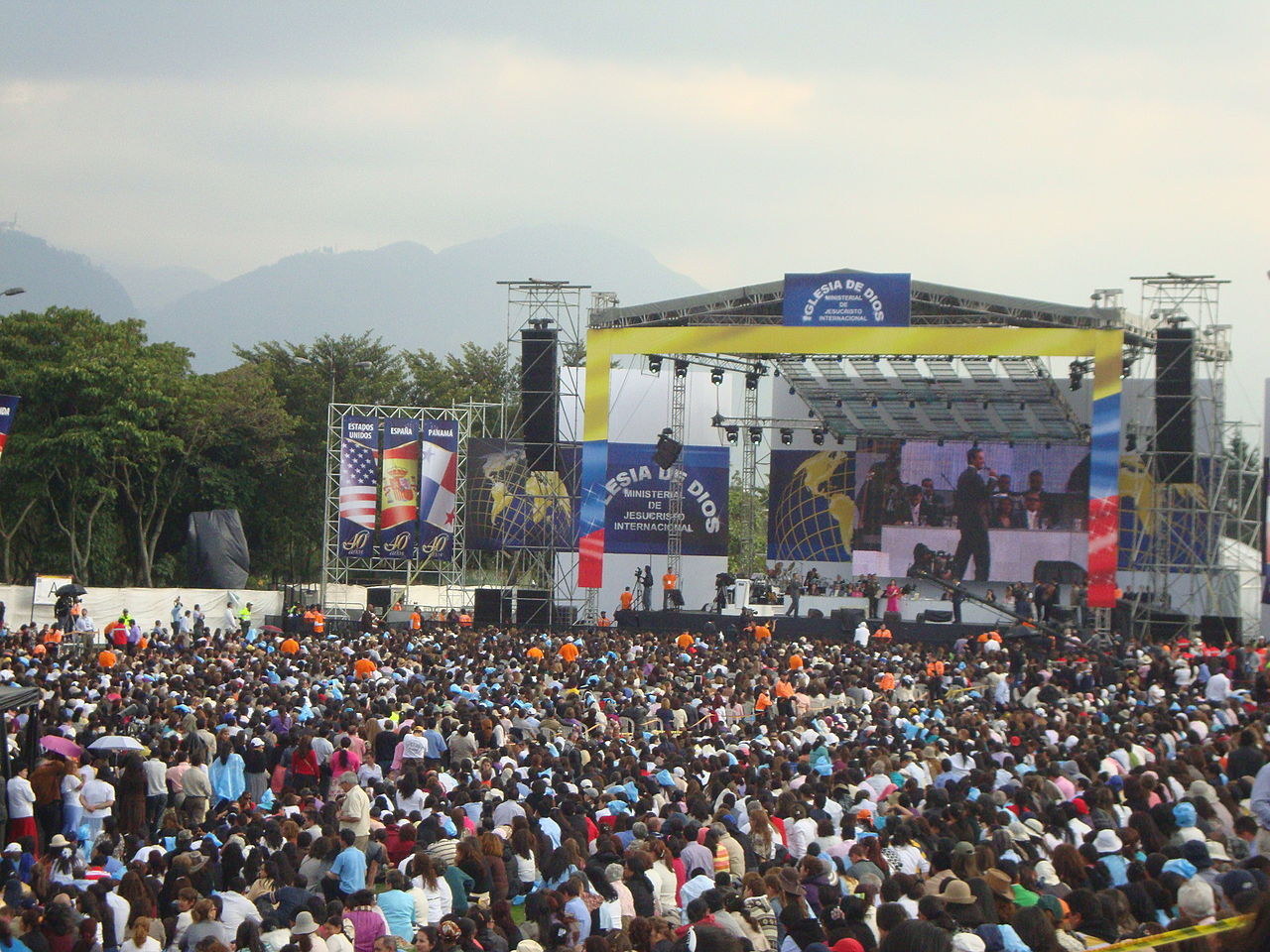
Rosario, a defector in Florida who asked that only her first name be used, recalled stumbling on the Ministerial when she and a friend were looking for someone to read them the Tarot. Like many other believers, she came to depend on the prophecy to make basic decisions and structure her life. As Rosario put it: “I became addicted to prophecy.”
Although any member of the church can receive the gift of prophecy, only Sister María Luisa is considered to have been selected by God to lead the flock. Piraquive’s name, Rocha said, often came up in the context of fear. One day the Queens congregation received a visit from the leader’s sister, who spoke at length about the injury, death, and disease brought by God upon the souls who dared bad-mouth María Luisa Piraquive.
Rocha and his family lost contact with friends and family who weren’t of the church. Their isolation was deepened by the fact that the Ministerial forbade celebrating “pagan” holidays like Christmas, Thanksgiving, or the New Year. The family dutifully paid the church its tithe. Rocha began to do odd jobs inside the church, including standing at the front to identify newcomers, just as he had been singled out that first day in Bogotá.
Meanwhile, the Ministerial ballooned. In Queens, Rocha watched as the original congregation quickly outgrew its cramped gathering place, eventually acquiring a large, low-slung warehouse in Woodside, right across the street from a sprawling Catholic cemetery. The building had previously housed a nightclub, leading some members to proudly remark how the church’s fateful growth was sowing good in the place of sin.
Another clear sign of the church’s success was the growing power of its political party in Colombia, the MIRA (a Spanish acronym for Independent Movement of Absolute Renewal). Much of this power accrued directly to María Luisa Piraquive’s closest circle. The party’s highest officeholders, those elected to the national congress, have included Piraquive’s daughter, her nephew, and a top spiritual leader in the church.
In the United States, the Ministerial is affiliated with a nonprofit called MIRA USA, whose stated purpose is to help immigrants with daily needs like access to food and health care. But according to several defectors, MIRA USA is essentially a vote-gathering machine for MIRA. If so, its work has been successful. During the 2014 elections, in the race for a national assembly seat that represents Colombians living abroad, MIRA received more votes than any other party — twice as many as the ruling party, which came in second place. In Colombia itself, by contrast, eight other parties had higher vote counts than MIRA.
In a letter to BuzzFeed News, the CEO of MIRA USA, María Clara Mur, said, “MIRA USA is an independent non-profit organization, not affiliated to any other organization,” although she acknowledged that many of the nonprofit’s volunteers are Ministerial followers. She also denied that MIRA USA is involved in gathering votes. Defectors consistently say, however, that MIRA USA’s work is routinely promoted in Ministerial temples, and that its activities are often timed with Colombian elections. There are other connections: The nonprofit’s logo is identical to that of the political party in Colombia, both espouse a philosophy they call miraísmo, and MIRA USA officers have run for office under the MIRA political banner.
One day in 2006, with national elections approaching in Colombia, Rocha received a message in prophecy: I will call upon you to assist in my material work. “That material work, of course, was MIRA,” Rocha said. Shortly thereafter, the pastor of the church in Woodside invited him to volunteer for MIRA USA. Prophecy fulfilled.
Defectors say that if a believer has a special set of skills, the church will almost certainly find a way to make use of it. Because of his medical training, Rocha was tasked with running a series of health education workshops for Colombian immigrants under the auspices of MIRA USA. Everyone who came to the workshops was asked to write down their name, phone number, and Colombian voter ID number. “The point was to get votes,” Rocha said. “To say, ‘See how MIRA is the party that cares about you?’”
Rocha’s education workshops kicked off roughly three months before the election. After the vote, they shut it all down.
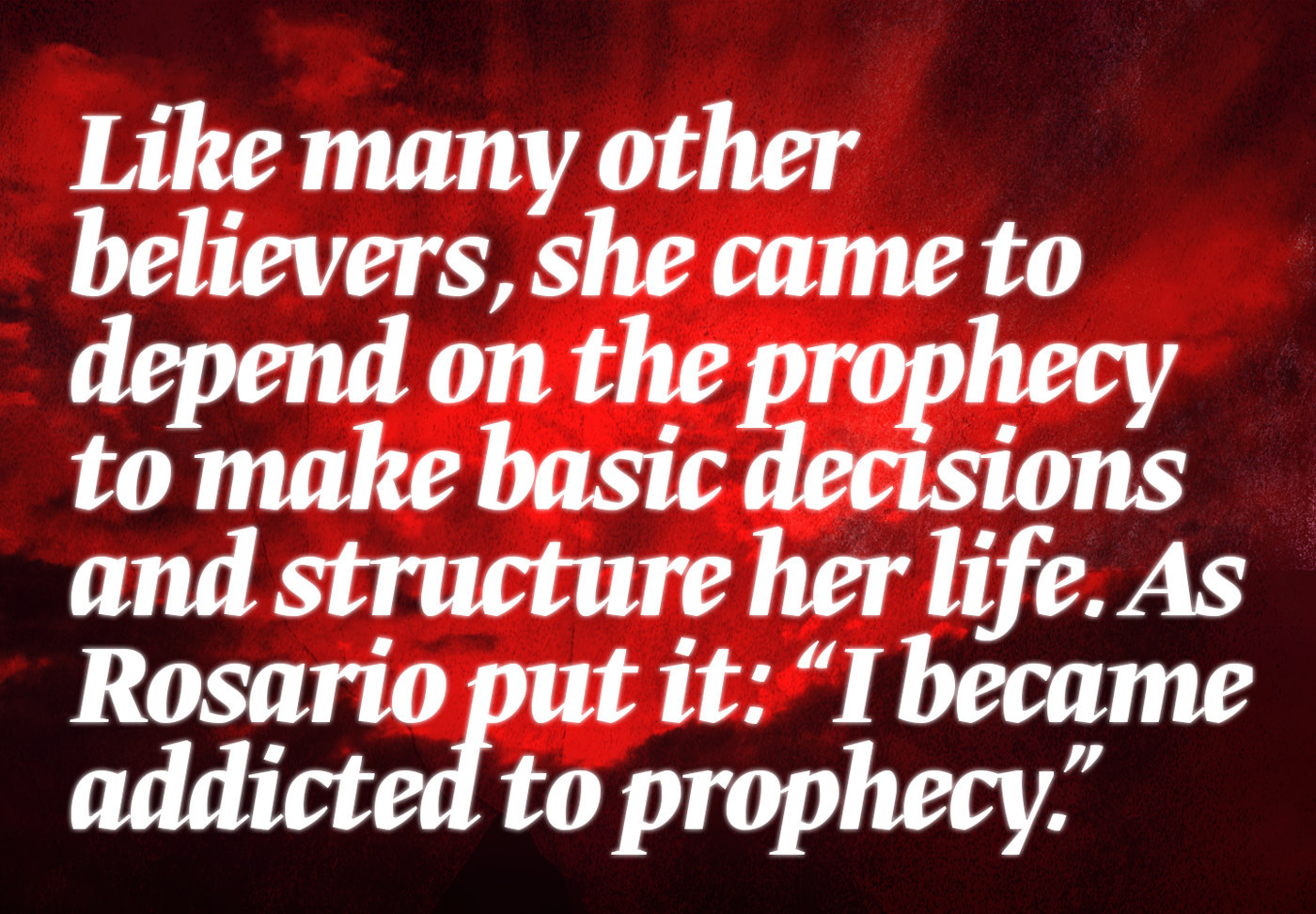
It never sat well with Doris Bohorquez that so much was bought and sold in the temples. When you walked into any of the bigger branches of the Ministerial, the first things you saw were shelves stacked with Bibles and hymnals produced by the church’s own publishing house, copies of Piraquive’s autobiography, DVDs of her Bible lessons, and CDs of her performing church songs backed by generic rock bands. Most of the churches also had a cafeteria that sold sodas and coffee and empanadas to the worshippers. Some even charged a dollar for parking.
Bohorquez chose to ignore the blatant commerce in favor of her own salvation. As a girl, before her father moved the family from Colombia to New Jersey, Bohorquez was deeply religious. “Ever since I was very small I wanted to be a nun,” she said. “I would run to see the nuns when they came to our neighborhood to teach the catechism, and I was always the first one there.” As she grew older, Bohorquez became disenchanted with Catholicism and its insistence on rigidly controlling the individual’s relationship to God. She fell in and out of various churches until, in her early forties, an acquaintance took her to a service at the Ministerial.
Bohorquez says today that she always maintained a skeptical distance from the church’s adoration of Sister María Luisa. What drew her in was prophecy. Eventually she earned the gift herself, laying hands on the head of believer after believer at the temple in Elizabeth, New Jersey. “I close my eyes and the words just flow,” Bohorquez said. “It is a very beautiful thing. I have a lot of respect for it.”
Outside the Ministerial, Bohorquez had a career as a real estate agent and tax preparer, and the church put both her skills and her office space to use. In 2009, she became the New Jersey coordinator for the María Luisa de Moreno International Foundation, the second charity (after MIRA USA) affiliated with the church. Bohorquez threw herself into the work. She organized one of the foundation’s most successful programs, serving free breakfasts to immigrant day laborers who gathered outdoors looking for work.
In time, Bohorquez noticed a pattern. Both of the church-affiliated charities were fond of holding different kinds of fundraisers — gala dinners, for example, or ersatz beauty salons in which church members paid for makeovers provided for free by other church members who had jobs styling hair or painting nails. All of that money, Bohorquez said, went to South Florida, where the church and nonprofits were headquartered.
Yet when the time came to foot the bill for the foundation’s charitable activities, Bohorquez was mostly on her own. She and her family often paid out of pocket for the free breakfasts for day laborers. Other times they gathered $5 or $10 donations from volunteers, or worked weekends at a local recycling center for cash to sink into groceries. The foundation never established its own office space, instead relying on Bohorquez to use her real estate office for all foundation activity.
The money flowed to the Ministerial’s leadership in Florida, but none of it ever flowed back.
Bohorquez’s responsibilities also allowed her a glimpse at the amount of capital the Ministerial was handling. In 2012, church leaders in New Jersey asked Bohorquez for help acquiring a new temple for the growing congregation. After searching for weeks, she settled on a big brick building on a leafy street in Plainfield.
Through a corporate entity named IDMJI Properties (after the church’s Spanish acronym), the Ministerial purchased the building on the spot for $850,000 in cash.
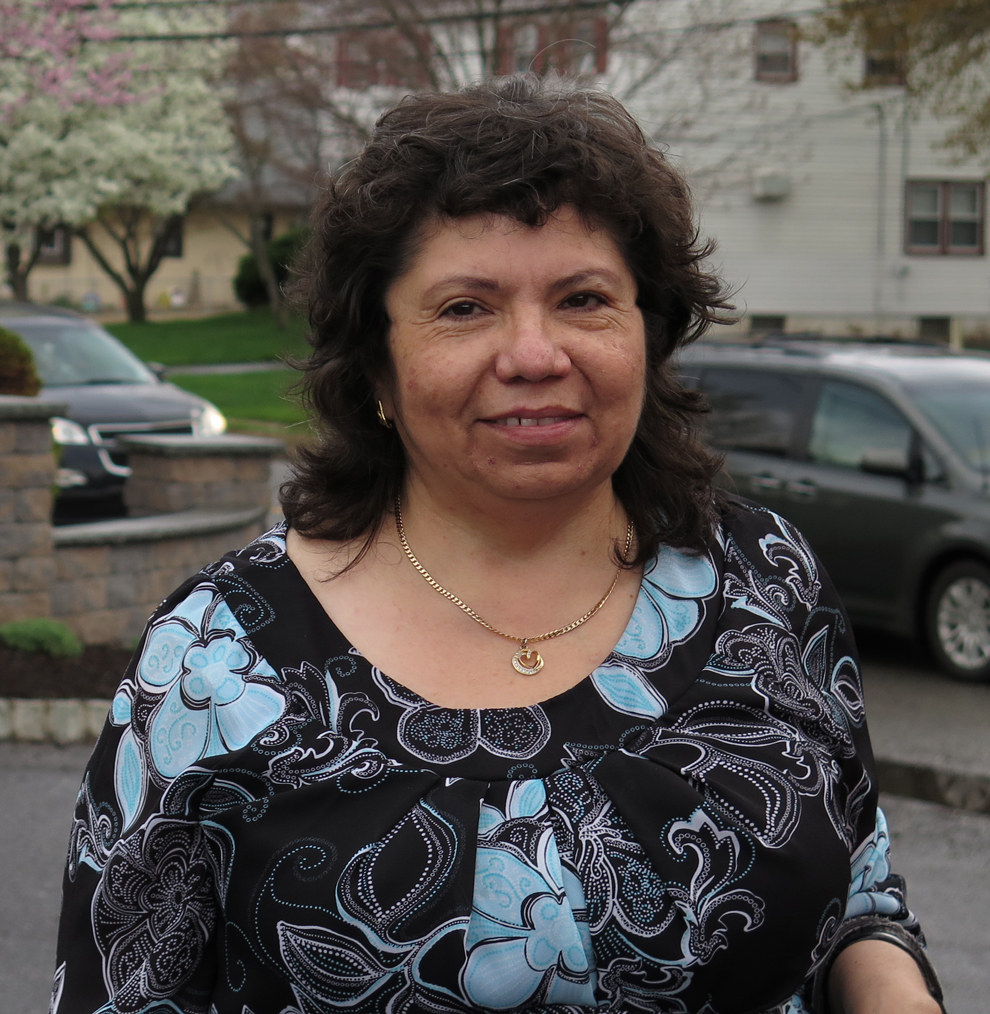
Because religious organizations in the United States are not required to file public tax returns, it is impossible to know how much money the church manages or what, if any, financial relationship it has with its affiliated nonprofits. But public records suggest that the Piraquive family has amassed substantial wealth in the United States, concentrated in South Florida, where several church defectors say María Luisa Piraquive makes her permanent home.
Piraquive and her immediate family — her two daughters, three sons, and their respective spouses — own seven residences in South Florida, according to public records. Collectively, these properties are worth roughly $5.8 million, according to property tax records. The family also manages a network of corporate holdings. In addition to the church itself and its two nonprofit arms, family members operate, among other ventures, a publishing house and editorial design company, which publishes the church's magazine, Zion, also sold to believers at Ministerial temples.
Most of the Piraquive residences are in Weston, a tony suburb of Miami that attracts many wealthy expats from Colombia. A church defector named María Julia said she worked for two weeks as a housekeeper for Piraquive’s youngest daughter, Perla, and described their homes as a cluster of mansions inside a gated community. The houses, Julia said, include garages where the family parks its fleet of luxury vehicles. Perla’s house had five bedrooms, five bathrooms (some with private steam rooms), and a safe to keep the cash collected in church.
Bohorquez estimates that she gave $150,000 of her personal money to the Ministerial over the years. Much of this went into the tithe — that obligatory 10% of income — and the extra offerings believers were encouraged to give as the Spirit moved them. This doesn't count all the money she sank into the foundation, including utility bills from using her office during off hours.
Defectors say that the church’s approach to the tithe was never openly coercive — there were no direct punishments for failing to tithe, and the church barely kept track of who gave what. However, the church did use the psychological power it wielded over its members, who believed, after all, that their eternal salvation depended on belonging to the church and were told at every opportunity that the tithe was a critical part of this belonging. Prophecies habitually admonished believers not to neglect to give God his due, lest foretold fortunes fail to materialize, as did sermons and church songs (“God Bless the Happy Giver,” “The Widow Gave of What She Did Not Have"). “You can see how you would feel intimidated when you hear all of those things,” Bohorquez said.
And so she gave, even when she didn’t have enough to give. “Sometimes I stopped paying my own expenses so that I could pay them,” she said. “I gave them everything.” Bohorquez suffered the consequences, filing for bankruptcy on several occasions.
“I did it because I truly wanted to obey God’s word ... I would think, God, I know your blessing can come at any moment,” Bohorquez said. “And that’s how you keep sinking, and sinking, and sinking.”

After her husband’s funeral, María Luisa Piraquive seized control of the church. Some pastors chafed at her rule, Angulo said. They were expelled.
Still the church kept growing, and in the meantime, Angulo developed a closeness with Piraquive that surpassed the one she had felt with Brother Luis. She accompanied the leader on many of her travels, sometimes sharing a room with her in the evenings, massaging Piraquive’s feet as she confided in her. Angulo told the leader that her husband was abusive — that he drank and slept around and sometimes hit her in the face and drew blood. By then, Angulo and her husband were well-known figures in the Ministerial, and Piraquive urged her to keep this information to herself, lest it damage the church's image. And she would give Angulo prophecies in which God reassured her that he would change her husband’s ways.
Angulo’s faith began to crack under the pressure of keeping up appearances. Piraquive would send her on occasional trips to “rehabilitate herself,” mostly intended, Angulo thought, to get her to stop talking about getting a divorce. On one such trip in 2002, Angulo visited Piraquive’s sister Beatriz in Panama around Christmastime. In accordance with Ministerial doctrine, Angulo had never celebrated Christmas with her children — no trees, lights, or gifts. When she arrived in Panama, she found Beatriz’s house covered in elaborate Christmas lights. When Angulo asked her why doctrine was being so flagrantly violated, Beatriz looked at her with pity in her eyes.
A few months later, in March 2003, Angulo went with Piraquive and other church leaders on a trip to Villa de Leyva, a tourist-oriented colonial town. Piraquive, who had sensed Angulo’s loyalty slipping, confronted her in the hotel.
“I know you no longer believe that I have God’s support,” Angulo recalls Piraquive telling her.
“Sister, do you or don’t you?” Angulo replied.
“I have no such [divine] support,” Piraquive said. “In fact, I don’t believe in that. It’s not my fault that other people do.”
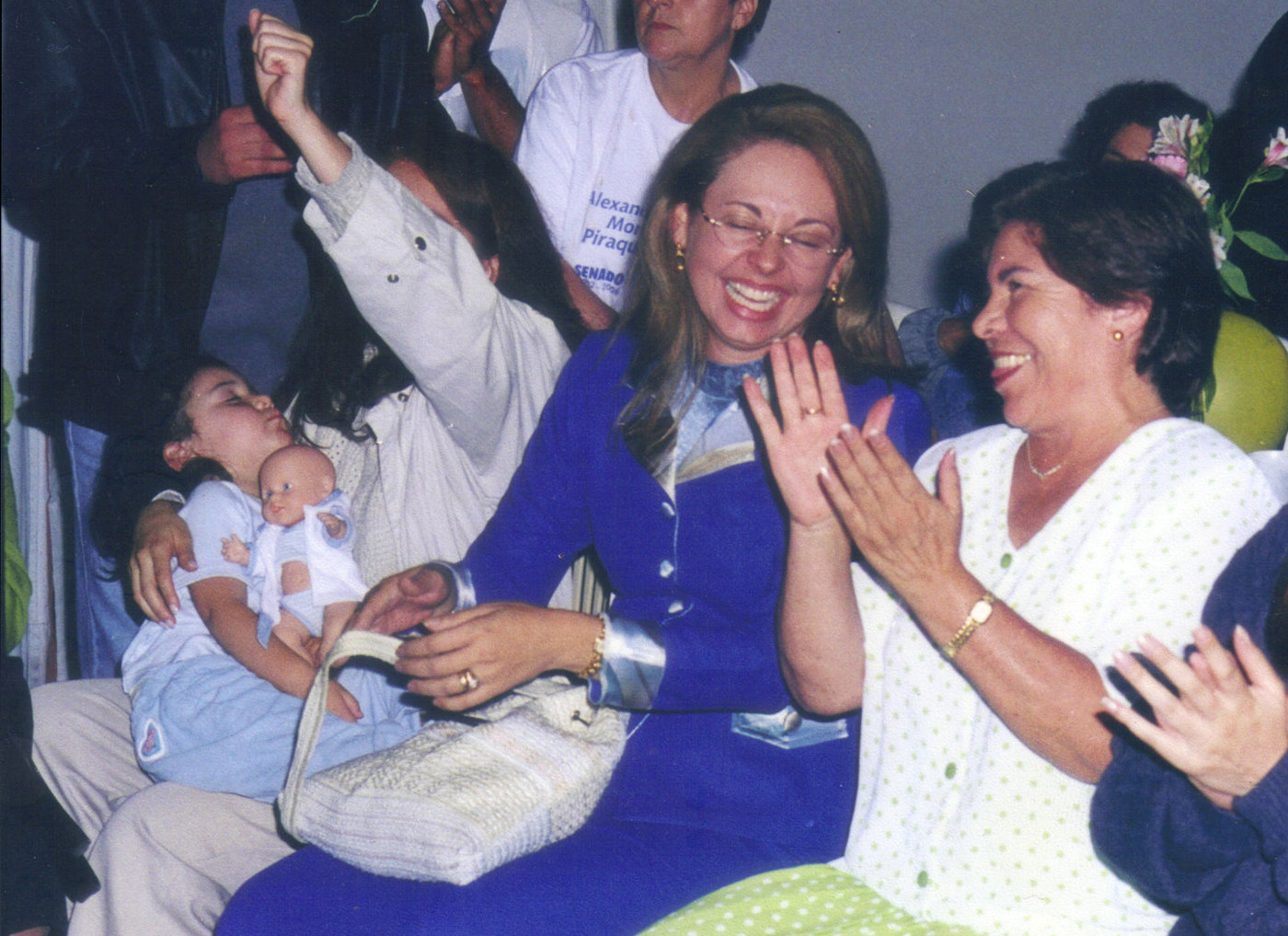
Angulo stayed in the church another year. “I was afraid,” she said. People who left the church were invariably called endemoniados — possessed by the devil — and told their betrayal would bring them poverty, suffering, and damnation. Her life had been reduced to the Ministerial. Her children were raised in the church, she had alienated her family outside of it, and those relatives who were still believers would turn their backs on her if she defected.
Not long after the confrontation in the hotel in Villa de Leyva, Piraquive forced Angulo's husband to stage a public act of contrition before their congregation. His demons, he said, had been cast out. Piraquive then made him pastor of a nearby congregation. Those days, Angulo said, became "a living hell." Unable to drink and philander in public, she said, he brought his liquor home with him. "He would get drunk, then he would tell me I had to fulfill my conjugal obligations," Angulo said.
Everything blew up one night when Angulo and her husband got in a physical fight and fell down the stairs of their house. Angulo fled the house and filed a police report. Then she filed for divorce. Months later, the judge issued a 15-page ruling granting Angulo a divorce and custody of their children on the grounds that she had been mistreated by her husband.
(Angulo’s ex-husband denied all of her allegations in an interview with BuzzFeed News, saying that their marriage dissolved as a result of infidelity on Angulo’s part, which also caused her to be expelled from the church.)
Angulo left the Ministerial for good in early 2004. In the ensuing years, the church suffered its first wave of national scandals. The Colombian press reported that Piraquive had expelled her son Iván Darío Moreno Piraquive from the church for being gay. In 2006, Iván Darío filed a complaint with prosecutors alleging that his father had died under mysterious circumstances, and that his mother had blocked his autopsy on the grounds that it would interfere with his resurrection. (When the complaint was made public years later, Colombian media reported that the attorney general was investigating Moreno’s death.) The complaint also alleged that Piraquive's youngest son was in fact her grandson, the illegitimate son of her oldest daughter. (Iván Darío later publicly retracted these statements and rejoined the church, and the Ministerial denies that it ever expelled him.)
That same year, church defectors leaked a book that the Ministerial allegedly used to train its pastors. Among its less flattering contents were passages that described, in detail, what should and should not be said during prophecy, suggesting that the ritual was something other than holy and spontaneous. Another passage, a list of the factors by which a pastor was judged to be in the church's good graces, was topped by the amount of money brought in through the tithe. Other passages instructed pastors to pray for calamities to befall any parishioners who abandoned or criticized the church. (The Ministerial says that this book is an “ongoing project” that has never been published, and that any copy obtained by BuzzFeed News “likely has been edited to attempt to discredit the Church.”)
Angulo became one of the Ministerial's most outspoken critics. Occasionally, she said, she gets anonymous death threats, some of them directed at her youngest daughter. Angulo's two older children remained in the church. "My children hate me, they detest me," Angulo said. "They think I'm the devil."
In August, as the church’s scandals dragged on and Angulo continued speaking out against the Ministerial, both children appeared on Colombian national TV saying that their mother's criticisms of the church were motivated by resentment from having been expelled. Not long after, Angulo found out, via social media, that she is a grandmother.
"Now I understand that that's what cults do," she said. "They separate families."

In January 2014, a video appeared online showing a speech that María Luisa Piraquive gave a class of future pastors. In it, Piraquive says that people with “physical defects,” such as those missing an arm, cannot rise to the pulpit, because it might turn potential believers away from the church. The video triggered a national scandal in Colombia and drew widespread condemnation for what appeared to be a flagrant policy of discrimination against the disabled.
The Ministerial says the video was “edited and taken out of context,” and that a Colombian court “ruled in favor of Sister Maria Luisa, finding there was no discrimination or violation of fundamental rights.” A Colombian court did, in fact, throw out a lawsuit against the church, but it did so, according to Colombian press reports, because the plaintiff was not a member of the church and thus had no grounds to sue.
The media tempest came at a terrible time for the church. Less than a month prior, in December 2013, a Ministerial pastor in Buenos Aires had been arrested for operating a drug-running ring out of his temple. (The church denies any knowledge of this activity, and says the man arrested in Buenos Aires was not a pastor. However, a church spokesperson told a Colombian newspaper that he was one of three pastors at the church, and media accounts consistently identified him as such.)
At the time, the Buenos Aires case got some media attention but went largely unremarked upon. Now the disability scandal had put the church in the headlines, and everyone was watching Piraquive's every move — including her arrival, surrounded by private bodyguards, at the office of the Colombian attorney general’s office to testify in an investigation into the church for money laundering and drug trafficking. Meanwhile, throngs of her followers marched down the streets of Bogotá in protest.
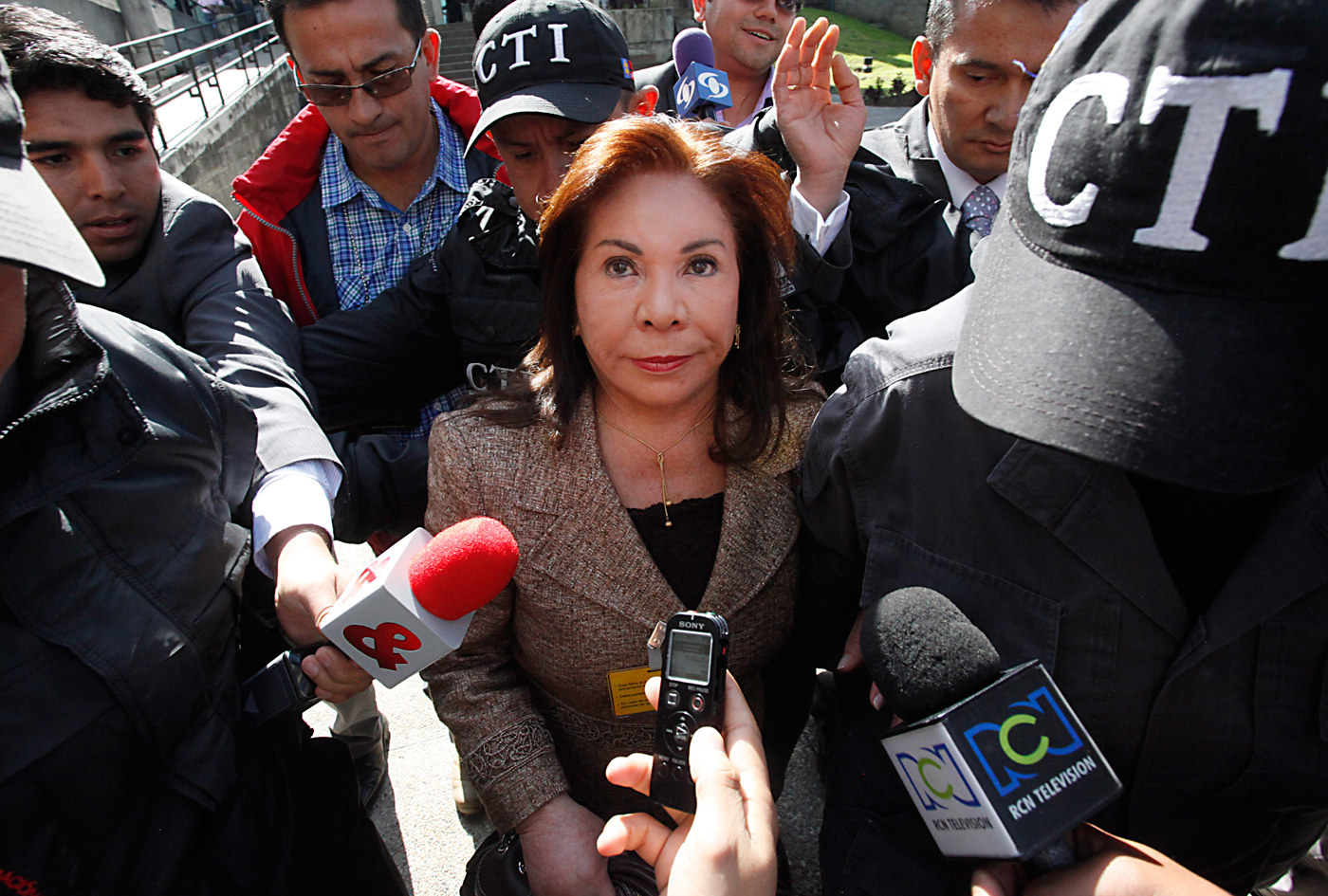
As Doris Bohorquez watched these scandals unfold from New Jersey, she felt herself growing increasingly uneasy. She had always had her doubts about the circulation of money within the church. Now she wondered whether she was in way over her head.
Bohorquez requested a meeting with the Ministerial’s top leader in New Jersey, a man named Luis Garcia. They met in the Ministerial temple in Plainfield — the same one Bohorquez had helped purchase for $850,000 in cash. She asked Garcia about the scandals. Garcia told her that God didn't like it when she asked questions about the church's finances. Such questions, she recalled him saying, are the devil's work — a sign that Bohorquez was endemoniada.
Then, as Bohorquez recalls, Garcia asked, "Sister, how are you, spiritually speaking?"
"Spiritually I'm fine, thank God," she replied.
"I don't think you understood me well," Garcia said. "How do you feel with regard to Sister María Luisa?"
Bohorquez tried her best to answer. "Sister María Luisa is a woman with qualities and defects," she said. "And it seems to me that recently she has been making a lot of mistakes."
Garcia flew into a rage. He got up from his chair and stood over Bohorquez, pointing his finger in her face and screaming: "How dare you talk like that about the servant of God? How dare you raise your voice against the anointed one?" (Garcia did not respond to multiple requests for comment.)
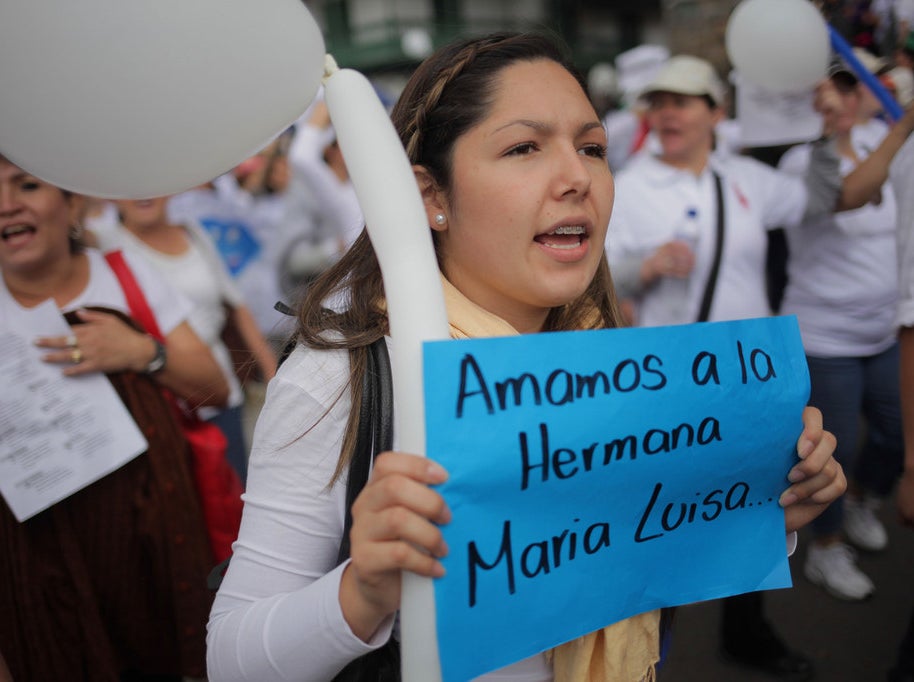
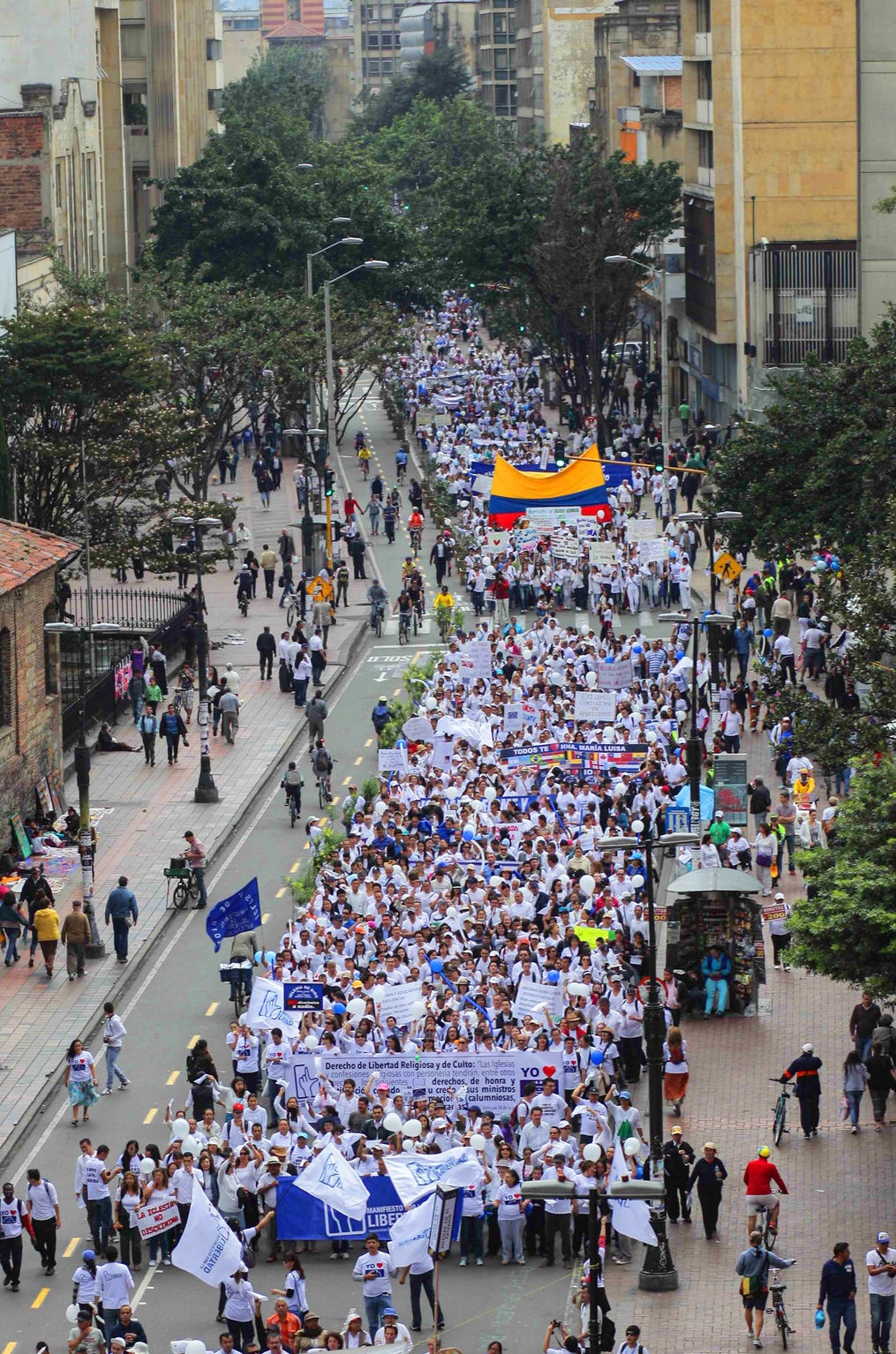
In the following weeks, Bohorquez decided to leave the church for good. "Going to church is supposed to make our loads light," Bohorquez said, referencing a line from the Gospel of Matthew. But she felt heavy every day. “I would go home from church and sit in my room and feel anguished, and I would wonder if maybe it was true that I had the devil inside me."
Leaving wasn't easy. Bohorquez kept thinking about the Old Testament parable of Aaron and Miriam, which came up frequently during sermons in reference to those who spoke ill of Sister María Luisa. Miriam, the parable told, had disparaged the wife of her brother Moses, and in retaliation God struck her with leprosy. "They play with people's minds that way," Bohorquez said. She later found out from friends who also left the church that local pastors had urged their flock to boycott her business.
The more Bohorquez's mind cleared, the more she began to feel that she had been defrauded. In August, she filed the first of two lawsuits against the Ministerial and its nonprofits. The lawsuits accuse the church of misrepresenting the nature of its fundraising activities and of conducting political activity in violation of IRS rules, and they request a refund, plus damages, of the money that Bohorquez gave the Ministerial over the years.
Bohorquez filed the suits herself, without an attorney. She sought advice from a lawyer friend, who recommended that she send a letter to the Ministerial's leaders offering to settle out of court. The Ministerial declined the offer. Instead, it sent Bohorquez a letter through its lawyers informing her that she was barred from setting foot on Ministerial property.
The church then filed two countersuits for defamation, one against Bohorquez and one against her 27-year-old son, in response to video interviews they conducted in November with a Colombian journalist in New Jersey. (Bohorquez's son had not initially been involved in the lawsuits.)
Around this time, the Ministerial was also pursuing a campaign of lawsuits against several journalists and news outlets in Colombia who had written articles critical of the church during the months that followed the disability scandal. According to Colombian media, the church has lost most of these suits.
In April, Bohorquez noticed an article on the webpage of Diario Extra, a Costa Rican news outlet that claimed it had acquired a document proving that the Colombian attorney general had exonerated Piraquive and the Ministerial in its investigation. Within a few hours, Colombian media debunked the claim.
The Ministerial told BuzzFeed News that Colombian prosecutors had cleared the church of any drug trafficking charges. A spokesperson for the attorney general initially declined to confirm whether Piraquive and the Ministerial were still under investigation, telling BuzzFeed News in an email that he suspects that Piraquive’s lawyer uses deceptive means, including having “fanatics” pose as reporters, to find out about her legal situation, and suggesting that a BuzzFeed News reporter might be one of them.
The spokesperson later denied that prosecutors had cleared Piraquive of drug trafficking charges and confirmed that she and the Ministerial remain under investigation.
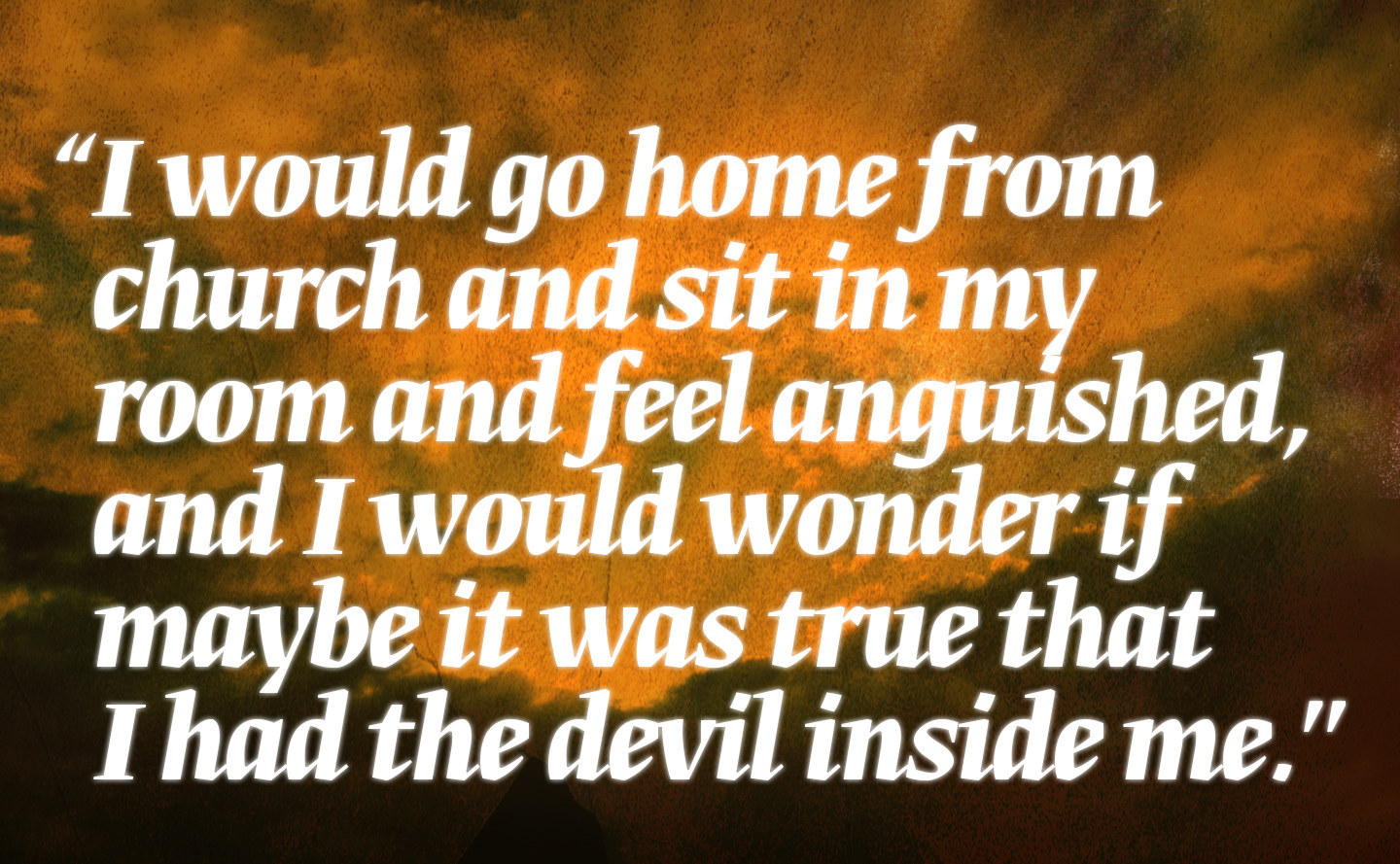
José Rocha and his family moved to Florida from New York in 2010. His wife had received job offers in several parts of the country, but they would only consider moving somewhere with a Ministerial temple. So they chose South Florida, the church’s epicenter in the United States.
They maintained their devotion for two more years before they decided to leave the church, because of disenchantment over the Piraquive family’s ostentatious wealth and a growing mistrust of the motivations behind María Luisa’s exaltation as a prophet.
For several months after they stopped going to church, Rocha and his wife were consumed by fear. At times Rocha couldn’t shake the thought that he would get hit by a car or suffer some other gruesome accident. "Every little thing that went wrong in my life was a sign that God was punishing me,” he said. “Our son got sick — clearly that was God punishing us for leaving the church."
That fear gave way to self-loathing and shame. "At the end of the story, you find yourself realizing that your entire life for more than a decade was built on a farce," Rocha said. He felt profoundly, inexcusably foolish. Worse, he felt a gnawing guilt over having brought his children up under a false prophet. He thought of all the Christmases he deprived them of. He thought back to the weeknights he dragged them to Queens from the Bronx on the subway, then dragged them home late and sleepy and without always having done their homework. He thought about those Sundays in Florida when they would spend all day at church, then go for a walk on the beach, the kids unable to enjoy themselves because they were still dressed in their church clothes. "It all seemed so ridiculous."
Rocha and his wife struggled to separate the life they had made together from the life they had made inside the church. "When you leave a cult, you come close to destroying everything you have," Rocha said.
And he was filled with questions. One of them turns up often in the thoughts of the Ministerial's defectors. The question appears in the first days of clarity, after the fear of damnation and death begins to lose its grip, clearing the way for the early, tentative steps of retrospection:
“Where have I been?”
